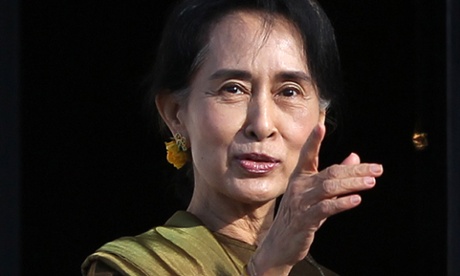
Displacement and discrimination continue to affect Rohingya (Evangelos Petratos EU/ECHO January 2013)
On November 12, the United Nations General Assemblyreleased its draft annual resolution against Burma, calling on the Burmese government to address 2013 "communalviolence." The terms "communal violence," "sectarian violence," and "inter-communal violence" have become go-to descriptors of attacks against Muslims in Burma. Insofar as they are used to describe specific incidents during the June and October 2012 attacks in Arakan State, the terms are to some degree accurate. But the blanket use of these terms to describe ongoing anti-Muslim attacks throughout Burma is inaccurate and even incendiary. It normalizes the misconception that in 2013, Muslims as a community have been both victims and perpetrators. In Burma's anti-Muslim climate, this misconception helps legitimize campaigns against Muslims and distract attention away from the government's complicity in these campaigns.
Ethnic and religious relations in Burma, and in Arakan State in particular, are to be sure incredibly complex, grounded in years of mistrust, inequality, abusive government intervention, and propaganda. Even so, this year's attacks have not been "communal." Communal violence is a term describing violence between two groups, for instance, two ethnic groups or two religious groups. The two or more participating groups are both perpetrators and victims of violence. But in Burma over the past year, Muslims have not been perpetrators. Muslims have been and continue to be clear victims of vicious Buddhist-led rhetorical, media, legal, political, and religious campaigns designed to marginalize, disenfranchise, and withhold justice from them.
The use of the terms "communal," "inter-communal," etc. is destructive in two ways: 1) it creates and allows for misunderstandings about the nature and source of anti-Muslim violence, and 2) it provides cover for the government's role in violence by directing public attention to the claims of Muslims and Buddhists instead of to the discriminatory legal and political context that capacitates violence. Both of these effects of bad discourse undermine genuine conflict resolution.
By ascribing labels like "communal" to the Muslims crisis, the media and international actors discursively alter the reality of the crisis, falsely shaping public opinion and policy. If the crisis is viewed as "communal" or "inter-communal," it can be partially cast as a crisis where all groups share blame. Real victims of the crisis are then treated as less deserving of justice and legal redress than they otherwise would be because they are perceived to be culpable participants, at least in terms of their ethnic/religious associations.
Describing these affairs as "communal" also distracts fromthe weight of the Burmese government's ethno-religious agenda, grounded in the ideology that those who are not Burmese and not Buddhist are less worthy of membership in the national identity. The government has perpetuated its ethno-religious agenda through legal discrimination and explicit violence against minority Muslims for years.
Burma's 1978 "Dragon King" operation is a helpful lens to understand the government's discriminatory agenda. During the operation, a government witch-hunting program scrutinizing the legality of Rohingya and other minorities degenerated into killings, sexual violence, and destruction by the government and the local Arakan population. 200,000 Rohingya were driven out of Burma. Occasional coordinated attacks against Rohingya and other Muslims continued throughout the 2000's.
Historic discrimination against Muslims allowed government security forces, during nearly all of the 2012 and 2013 attacks, to stand by and watch, and in many cases, participate in the violence against Muslims with impunity.
Anti-Muslim attacks since June 2012 have been systematic and pre-planned, fueled by insidious government and monastic anti-Islamic pamphlets and rhetoric. President Thein Sein, a strident defender of Burma's infamously anti-Muslim monk Wirathu, has himself announced that the "only solution" for the crisis is for the Rohingya to be moved en masse out of the country or into camps. In Arakan State, he has achieved his goal to some degree – nearly 140,000 Rohingya have been imprisoned in camps and tens of thousands have fled since 2012. The government has repeatedly recognized the organized nature of the attacks, but has chosen not to intervene, even with prior intelligence. This is in large part because the attacks are in lock step with the government's ethno-religious ideology, and because, according to some experts, the attacks empower government force and authority during the so-called transition to civilian rule.
Calling the attacks "communal" is bad discourse and has the power to normalize the belief that fault lies within the two communities, rather than outside of those communities. The UN and other international actors have become enthusiastic advocates for the Burmese government to help "soothe over" ethno-religious tensions, which they view to be the primary cause of the "inter-communal" violence. But the Burmese government, far from being an agent capable of soothing over ethno-religious tensions, is the key perpetrator of anti-Muslim discrimination, a tried-and-true master of ethno-religious conflict; it has successfully played this role for decades.
Bad discourse provides an excuse for international actors to avoid addressing the difficult, deep structural problems that are most influential in fueling violence and enabling it to continue: systemic impunity, legal discrimination, and government policy and complicity. Given these structural problems, even if social tensions were to be suddenly "soothed over," Burma's crisis would not be resolved. The roots of violence are hardly found in the local Buddhist and Muslim communities alone.
It is a fool's errand to attempt to resolve anti-Muslim violence in Burma without recognizing and addressing the government's role. Properly identifying the Muslim crisis for what it is – systemic and widespread attacks against a marginalized minority capacitated by the government – is the first and imperative step toward genuine resolution.






 Aung San Suu Kyi. Photograph: Peter Muhly/AFP/Getty Images
Aung San Suu Kyi. Photograph: Peter Muhly/AFP/Getty Images

